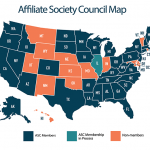“I’m a woman of many hats,” laughs Gwenesta B. Melton, MD, FACR, of Fayetteville, N.C., the newly appointed chair of the ACR’s Affiliate Society Council (ASC), as she describes her involvement with advocacy in rheumatology.

Dr. Melton
Indeed, since transitioning from her private clinical practice, Dr. Melton has kept a very full calendar. In early March, she had just returned from the Winnipeg meeting of the Canadian Rheumatology Association, where she represented the Association of Woman in Rheumatology (AWIR)—an organization she co-founded with Grace Wright, MD, and for which she serves as vice president. She is active in ACR advocacy at the state and federal levels and is a past president of the North Carolina Rheumatology Association (NCRA). She is also still on faculty with Campbell University School of Osteopathic Medicine, Lillington, N.C., where she teaches medical students and continues teaching advance practitioners about rheumatology.
Goals for the ASC
Dr. Melton’s involvement with the ASC reaches back more than a decade, dating to her past presidency of the NCRA. At that time, she was taken with the ASC mission to share best practices in funding and setup with state societies, helping physicians survive in the delivery environment. The pandemic slowed those initiatives down, she says. Her intentions for the next three years are to reenergize the council, “to make certain that it is strong and working in collaboration with the ACR, with the Coalition of State Rheumatology Organizations (CSRO) and with AWIR.” By fostering these active collaborations, it will be possible to amplify advocacy efforts, she believes.
The need for advocacy remains great, Dr. Melton points out, given the patchwork characteristics of state-specific policies and regulations that govern care delivery. Depending on the state, rheumatologists and their patients may be facing such barriers to care and payment as accumulation adjustment programs, rebate pass-throughs, step therapy prescriptions or limits on biosimilars.
“State societies need to be strong, because there is a lot of state-specific legislation that may affect the care of their patients,” Dr. Melton asserts. Whenever she talks with society leaders, she emphasizes the tangible benefits that alignment with the ASC brings. The ASC can play a valuable role in mentoring state societies, from beginning stages to ongoing projects, she says, and by furnishing resources on developing bylaws, guidance on avoiding conflicts of interest with pharmaceutical company support and the like.
Dr. Melton also notes that the ASC offers crucial benefits to community rheumatologists and wants to help strengthen the connection between the ASC and the ACR. She points out that one of the pillars of the ACR presidency of Deborah Dyett Desir, MD, is to help community-based rheumatologists. “Community-based rheumatologists tend to go to their state society meetings, so if ASC is seen as an ACR benefit, they might then reassess their relationship to the ACR,” Dr. Melton reasons.

